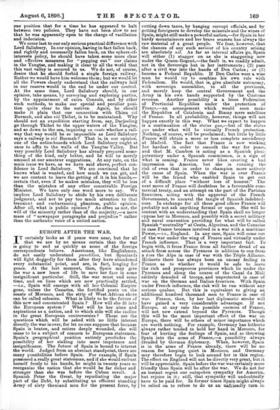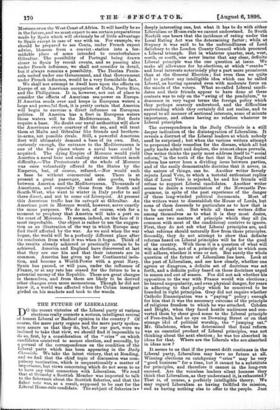EUROPE AFTER THE WAR.
IT certainly looks as if peace were near, but for all that we are by no means certain that the war is going to end as quickly as some of the foreign correspondents believe. Americans, like Englishmen, do not easily understand punctilios, but Spaniards will fight doggedly for them after they have abandoned every substantial point, and are, in fact, longing for peace. At the last moment, then, Spain may give the war a new lease of life to save her face in some insignificant particular. Still, the war must end some time, and on lines which are now practically settled, —i.e., Spain will emerge with all her Colonial Empire gone, unless the Canaries, the fortified posts on the coasts of Morocco, and the strip of West African shore can be called colonies. What is likely to be the future of this new and concentrated Spain ? How will she fit into the European system ? What will be her aims and aspirations as a nation, and to which side will she incline in the great European controversies ? These are the questions which will be asked with no little interest directly the war is over, for let no one suppose that because Spain is beaten, and retires deeply wounded, she will cease to be a subject of concern to European statesmen. Spain's geographical position entirely precludes the possibility of her sinking into mere impotence and insignificance. The future of Spain is bound to interest the world. Judged from an abstract standpoint, there are many possibilities before Spain. For example, if Spain possessed a really great statesman, and if she would entrust herself freely to his hands, he might in twenty years so reorganise the nation that she would be far richer and stronger than she was before the Cuban revolt. A Spanish Peter the Great, by repudiating the major part of the Debt, by substituting an efficient standing Army of sixty thousand men for the present force, by cutting down taxes, by hanging corrupt officials, and by getting foreigners to develop the minerals and the wines of Spain, might still make a powerful nation,—for Spain in her hardy mountaineers and her brave seamen has always the raw material of a great people. We fear, however, that the chances of any such saviour of his country arising are absolutely nil. As far as internal affairs go, Spain will either (1) stagger on as she is staggering now under the Queen-Regent,—the fault is, we readily admit, not in the Sovereign but in her instruments ; (2) pass after a civil war into the hands of Don Carlos ; or (3) become a Federal Republic. If Don Carlos were a wise man he would try to combine his own rule with Federalism. He would, that is, give absolute autonomy, with sovereign assemblies, to all the provinces, and merely keep the central Government and the Army in his own hands supported by the Customs revenue. Another possibility is a loose Federation of Provincial Republics under the protection of France,—an arrangement which would soon make the Republics of Catalonia and Biscay mere satellites of France. In all probability, however, things will not happen exactly in this way. What we expect to happen is a continuation of the status quo,—but of the status quo under what will be virtually French protection. • Nothing, of course, will be proclaimed ; but little by little France will obtain a more or less complete ascendency at Madrid. The fact that France is now working her hardest in order to smooth the way for peace, and that M. Cambon is acting as a Spanish pleni- potentiary under a Spanish commission, is a, sign of what is coming. France never likes creating a bad impression in America, but she is running the risk of even that in order to champion more actively the cause of Spain. When the war is over France will be the friend who enabled Spain to get out of a difficult place "without loss of honour." The next move of France will doubtless be a favourable com- mercial treaty, and an attempt on the part of the Parisian financiers, acting with the approval of the French Government, to unravel the tangle of Spanish indebted- ness. In exchange for all these good offices France will probably not ask anything formal or open. She will be content with an understanding that Spain shall no longer oppose her in Morocco, and possibly with a secret military and naval convention providing for what will be called Spanish "neutrality" at Ceuta, Algeciras, and the Canaries in case France becomes involved in a war with a maritime Power,—i.e., England. In any case, Spain will come out of the war under the wing of France and virtually under French influence. That is a very important fact. To begin with, it frees France from all further dread of an attack from across the Pyrenees in addition to one from a rasa the Alps in case of war with the Triple Alliance. Hitherto there has always been an uneasy feeling in France as to whether it would be safe to leave the rich and prosperous provinces which lie under the Pyrenees and along the course of the Canal du Midi entirely denuded of troops, and unprotected in case of war on the German and Italian frontiers. With Spain under French influence, the risk will be run without any serious qualms. But this is equivalent to giving an additional hundred thousand men to France in case of war. France, then, by her last diplomatic stroke will have gained a very considerable advantage. If not Europe, at any rate the possible enemies of France, will not now extend beyond the Pyrenees. Though this will be the most important effect of the war on Europe, there will be others of minor importance which are worth noticing. For example, Germany has hitherto always rather tended to hold her hand in Morocco, for fear of hurting the feelings of Spain, and so throwing Spain into the arms of France,—a possibility always dreaded by German diplomacy. When, however, Spain is in the arms of France already, there will be no reason for keeping quiet in Morocco, and Germany may therefore begin to look around her in this region. The effect on England will not be directly very great, but it will be appreciable. Spain before the war was certainly more friendly than Spain will be after the war. We do not for an instant regret our outspoken sympathy for America, but rejoice in it ; still, that sympathy will undoubtedly have to be paid for. In former times Spain might always be relied on to refuse to do us an unfriendly turn in Morocco or on the West Coast of Africa. It will hardly be so In the future,and we must expect to see certain preparations made by Spain which will obviously be of little advantage to Spain except in case of war with us. For example, we should be prepared to see Ceuta, under French expert advice, blossom from a convict - station into a for- midable place of arms intended to counterbalance Gibraltar. The possibility of Portugal being drawn closer to Spain by recent events, and so passing also under French influence, we shall not consider in detail, but it always remains a possibility. The Iberian Penin- sula united under one Government, and that Government under French influence, would be a, very formidable fact.
We shall not attempt to dwell here upon the effects on Europe of an American occupation of Cuba, Porto Rico, and the Philippines. It is, however, not out of place to consider the effects of American sea-power on Europe. If America sends over and keeps in European waters a large and poweiful fleet, it is pretty certain that America will begin to exercise a direct influence on European politics. If America has a fleet in European waters those waters will be the Mediterranean. But fleets require a base. No doubt our naval authorities will show the Americans every courtesy of the sea, and will treat them at Malta and Gibraltar like friends and brothers- in-arms, not possible rivals. Still, a powerful American fleet will ultimately demand a base of its own. But, curiously enough, the entrance to the Mediterranean is one of the few places where a naval base could be acquired. The dying Empire of Morocco would yield America a naval base and coaling station without much difficulty.—The Protectorate of the whole of Morocco was once voluntarily offered to the States by the Emperor, but, of course, refused.—Nor would such a base be without commercial uses. There is at present a great passenger, and also goods, trade between America and the Mediterranean. Thousands of Americans, and especially those from the South and South-West, who want to winter in Italy prefer to sail there direct, and not to come vid Liverpool. At present this American traffic has its entrepot at Gibraltar. An American port in Morocco would, however, serve exactly the same purposes. We do not, of course, wish for a moment to prophesy that America will take a port on the coast of Morocco. It seems, indeed, on the face of it most improbable. Our object is rather to use the sugges- tion as an illustration of the way in which Europe may find itself affected by the war. As we said when the war began, the world will be a perfectly different place after its conclusion from what it was when it began. Think of the results already achieved or practically certain to be achieved. America and England have discovered at last that they are one kin and that their interests are in common. America has given up her Continental isola- tion, and become a World-Power with a great Navy. Spain has passed, or will pass, under the influence of France, or at any rate has ceased for the future to be a potential enemy of the Republic. These are great changes in themselves, and from them are likely to be derived other changes even more momentous. Though he did not know it, a world was affected when the Cuban insurgent girded on his machete and took to the woods.



































 Previous page
Previous page